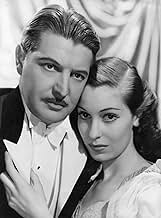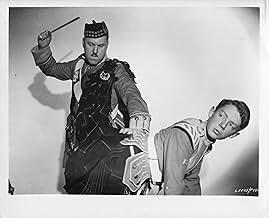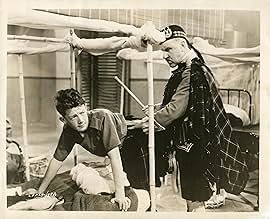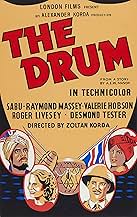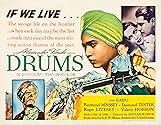AVALIAÇÃO DA IMDb
6,3/10
997
SUA AVALIAÇÃO
Adicionar um enredo no seu idiomaIn British India, Captain Carruthers investigates arms smuggling on the North West Frontier. The governor makes peace with Tokot's ruler. Prince Azim bonds with Carruthers and learns drums f... Ler tudoIn British India, Captain Carruthers investigates arms smuggling on the North West Frontier. The governor makes peace with Tokot's ruler. Prince Azim bonds with Carruthers and learns drums from British boy Bill Holder.In British India, Captain Carruthers investigates arms smuggling on the North West Frontier. The governor makes peace with Tokot's ruler. Prince Azim bonds with Carruthers and learns drums from British boy Bill Holder.
- Direção
- Roteiristas
- Artistas
- Prêmios
- 1 vitória e 1 indicação no total
Francis L. Sullivan
- Governor
- (as Francis L.Sullivan)
Laurence Baskcomb
- Zarullah
- (as Lawrence Baskcomb)
Julien Mitchell
- Sergeant
- (as Julian Mitchell)
Avaliações em destaque
In colonial India, the natives live happily and peacefully under the kind rule of their British masters. Representing the bond between the two nations, young Prince Azim befriends several of the British officers. However his uncle Ghul is less welcoming of the British and has dark plans to slaughter them and raise a rebellion among the tribes of the hills.
Some critics have pointed to the fact that, if this film were made today, it work spark outrage and be roundly condemned. This view ignores that, when the film was first screened in India in the late 30's, it sparked riots among the populace. However, the statement is true as well as being null and void, for there is zero danger of this film ever being made now! The plot is very pro-Empire and it is brazenly flag waving for the British. Looking back now, the film is laughable in it's depiction of it's characters. The British are kind and loving to all the Indians they encounter, while the Indians love them in return; those that don't are, of course, shifty and untrustworthy.
This is rather insulting if you think about it too much - I must admit I wasn't offended but then I am neither English or Indian and know little of the history that is clearly being twisted here in favour of propaganda. The film does have a nice vein of good humour to it though that prevents it being too heavy, while the battle scenes are of the `up'n'over' school of filming. The plot itself is too simplistic and can't keep the charade up - especially now that it will be clear to most viewers that it isn't a fair telling.
The cast are good, but again, there's no way that an `Indian' film would be shot today in Wales with the majority of the cast in blackface! The standout actor is Sabu. True his character is a little too good to be true but he has cheeky attitude and he is good fun throughout - just a shame his character seem to vanish for about a quarter of the film. The villainous Massey is also good fun and I enjoyed his performance. The British (namely Livesey and Hobson) are very stiff, although they do get the more heroic roles towards the end.
Overall this film is worth seeing as we will hopefully not see quite it's like again. The film is un-PC in casting, script, plot and characters, while the history it claims to tell is nothing more than a flag waving exercise that rightly started angry riots in Indian when it was shown there. However it is worth seeing for the period, the glorious (for the time) Technicolor and an amusing and fun performance from Sabu.
Some critics have pointed to the fact that, if this film were made today, it work spark outrage and be roundly condemned. This view ignores that, when the film was first screened in India in the late 30's, it sparked riots among the populace. However, the statement is true as well as being null and void, for there is zero danger of this film ever being made now! The plot is very pro-Empire and it is brazenly flag waving for the British. Looking back now, the film is laughable in it's depiction of it's characters. The British are kind and loving to all the Indians they encounter, while the Indians love them in return; those that don't are, of course, shifty and untrustworthy.
This is rather insulting if you think about it too much - I must admit I wasn't offended but then I am neither English or Indian and know little of the history that is clearly being twisted here in favour of propaganda. The film does have a nice vein of good humour to it though that prevents it being too heavy, while the battle scenes are of the `up'n'over' school of filming. The plot itself is too simplistic and can't keep the charade up - especially now that it will be clear to most viewers that it isn't a fair telling.
The cast are good, but again, there's no way that an `Indian' film would be shot today in Wales with the majority of the cast in blackface! The standout actor is Sabu. True his character is a little too good to be true but he has cheeky attitude and he is good fun throughout - just a shame his character seem to vanish for about a quarter of the film. The villainous Massey is also good fun and I enjoyed his performance. The British (namely Livesey and Hobson) are very stiff, although they do get the more heroic roles towards the end.
Overall this film is worth seeing as we will hopefully not see quite it's like again. The film is un-PC in casting, script, plot and characters, while the history it claims to tell is nothing more than a flag waving exercise that rightly started angry riots in Indian when it was shown there. However it is worth seeing for the period, the glorious (for the time) Technicolor and an amusing and fun performance from Sabu.
The British are trying to make peace treaties with numerous tribes in India to make sure there isn't an uprising among rebel tribes. Captain Carruthers makes a treaty with the prince, but when the prince's brother (Prince Ghul) murders the prince, he now has the tribes just where he wants him (in a spot to annihilate the British). The murdered prince's son (Prince Azul) reaches Carruthers and tells him of what happened, so Carruthers takes a troop to Ghul's fortress. Ghul welcomes Carruthers with a ceremony of a 5 day feast, but when the feast is over Ghul plans to kill all the British troops with their smuggled machine guns, unless Azim can lead a British battalion to Tokot to stop Ghul's mad plan. Despite being politically incorrect with the British superiority over the people of India, the film does contain a fair amount of action and thrills to entertain the film going audience, granted it is no Gunga Din or Four Feathers (the latter of which and this film share the same author). Massey oozes evil as Ghul, and their is decent support with Sabu, youthful as ever as Azim, Massey as the stuffed shirt Carruthers, and Hobson as his wife. The score is decent, but not that rousing and shooting in color limited the best chances to use lighting. Rating, 7.
Fun little movie that depicts the British and Indians living in some sort of Utopia together, with an evil villain (Raymond Massey, hamming it up with a vengeance) planning to slaughter the British troops at a banquet. It's up to his prince nephew, Sabu--the greatest of all child actors--to stop him. Definitely politically incorrect (although not outright racist), but with a lot of heart and humor. The humor disappears at the end in place of heavy suspense, and it's all wrapped up with a rousing, drawn-out battle scene. Hey, any movie with Scottish highlanders singing around a campfire is worth watching if you ask me. And it's in Technicolor to boot. 7/10.
Great morale booster for the British people, with another World War looming. Shows the bonding between British and Indians that contributed to the long sojourn of the British in India. Definitely a boy's film with all the majesty that the Empire films of the thirties could muster for audiences suffering from economic depression and worries over the rise of fascism and its onward march. Roger Livesey's character brings to life the type of relationship that so many British civilians and civil servants enjoyed with Indians, so sadly ignored/forgotten in the interest of history revision and political correctness.
Plot-- British colonial rule in parts of India is imperiled by the murder of the local monarch by his sinister brother (Massey). Now the British contingent (Livesey, Hobson, et al.) must rely on the young pro-British nephew (Sabu) to rally against the usurper.
As a boy growing up in a small mid-western town, I never missed this epic and its companion feature Four Feathers (1939) in our theater. After all, where else in pre-TV middle America could all that scenic exotica be seen. The be-turbaned Indian natives, the be-skirted English soldiers, the high mountain passes, all in rich Technicolor, along with the rich pageantry of masses of people moving here and there. And shouldn't forget the crackling, if somewhat clichéd, storyline, along with a charmingly youthful Sabu, a gloweringly sinister Raymond Massey, and a slim, long-limbed Valerie Hobson. Then there's that thundering drum, along with slinky native girls and twirling British Highlanders. The Korda's certainly spared no expense and it shows, from spirited opening to satisfying close. Sure, the subtext amounts to British colonial propaganda that no longer wears well. Still, the lavish spectacle remains, a treat for the eye. Of course, I've changed in many ways from those earlier days, but the Korda production can still entertain and impress, if given half a chance.
As a boy growing up in a small mid-western town, I never missed this epic and its companion feature Four Feathers (1939) in our theater. After all, where else in pre-TV middle America could all that scenic exotica be seen. The be-turbaned Indian natives, the be-skirted English soldiers, the high mountain passes, all in rich Technicolor, along with the rich pageantry of masses of people moving here and there. And shouldn't forget the crackling, if somewhat clichéd, storyline, along with a charmingly youthful Sabu, a gloweringly sinister Raymond Massey, and a slim, long-limbed Valerie Hobson. Then there's that thundering drum, along with slinky native girls and twirling British Highlanders. The Korda's certainly spared no expense and it shows, from spirited opening to satisfying close. Sure, the subtext amounts to British colonial propaganda that no longer wears well. Still, the lavish spectacle remains, a treat for the eye. Of course, I've changed in many ways from those earlier days, but the Korda production can still entertain and impress, if given half a chance.
Você sabia?
- CuriosidadesThe film caused protests when shown in Bombay and Madras, as it was considered by many to be British propaganda.
- Versões alternativasVersion shown on Turner Classic Movies from "The Criterion Collection" runs 93 minutes
- ConexõesFeatured in Family Classics: Family Classics: The Drum (1964)
Principais escolhas
Faça login para avaliar e ver a lista de recomendações personalizadas
- How long is The Drum?Fornecido pela Alexa
Detalhes
- Tempo de duração
- 1 h 44 min(104 min)
- Proporção
- 1.37 : 1
Contribua para esta página
Sugerir uma alteração ou adicionar conteúdo ausente

